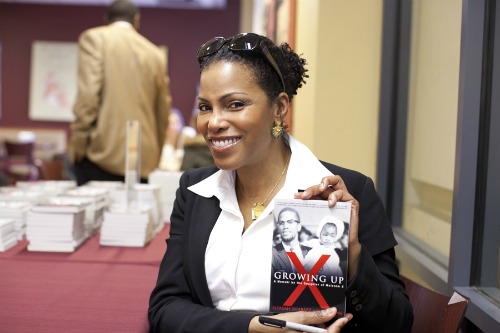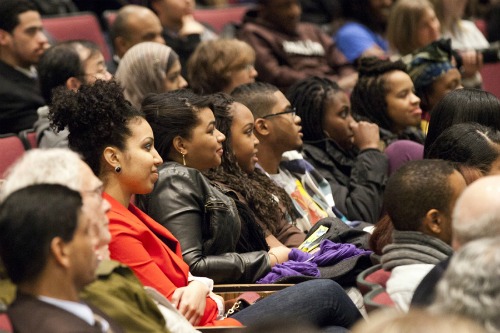Shabazz challenges students to stand up to injustice
Her memories of her father, Malcolm X, are but “flickering images,” Ilyasah Shabazz told a hushed crowd at the annual Martin Luther King Jr. Convocation Thursday evening.
“I was just a child, not quite 3 years old, when my father was assassinated, when he was martyred,” recalled Shabazz, who was there in the Audubon Ballroom in Harlem with her mother and two of her sisters on Feb. 21, 1965, the day her father was gunned down.
“Like most children, I was in love with my father. He was Daddy, and our house came alive in a very special way when he came home. He was tall, a little over 6-foot-4, and he had big, white pearly teeth that would pierce through an enormously beautiful smile.
“My mother often spoke of my father and our special ritual. In the evenings, I would wait for him at the front door. He’d come in, wash his hands, pick me up and hold me in one arm while holding a plate of homemade cookies my mother had made and a newspaper in the other. We’d go into the den to watch the evening news and share these cookies.”
Just a week before her father was killed, their family home in Queens had been firebombed—on Valentine’s Day. The family escaped without injury, but their home was destroyed. Now, with her husband dead, no home and very little money, his widow, Betty Shabazz, pregnant with twins, moved her family for a time into the home of actor and activist Sidney Poitier.
“I would find my way at the Poitiers’ house to the front door and look out the window for my father, after he was killed,” Shabazz said. “And my mother couldn’t explain back then death to a toddler. So she began taking a cookie and breaking it in half and leaving it for me on a plate at the front door.”
Shabazz doesn’t remember her father’s assassination, or the special ritual she shared with him. She heard about the ritual years later, from her mother, and it came as a revelation: For years, her friends had given her cookies or cookie jars as gifts for the holidays.
‘A man of great compassion and impeccable integrity’
At 6 feet with white pearly teeth of her own, Shabazz—author of the critically acclaimed memoir Growing Up X, activist, lecturer, and director of arts and culture for the City of Mount Vernon, N.Y.—bears a striking resemblance to her father.
And she clearly inherited from him and her mother—a nurse, educator and civil rights activist in her own right who raised six children—a lifelong passion and commitment to fight injustice.
While Malcolm X was highly critical of King’s tactics at times, the two civil rights leaders shared much in common, Shabazz said.
“Much like Martin Luther King Jr., Malcolm X was a selfless man,” she said. “He was a man of great compassion and impeccable integrity.”
Shabazz noted that Malcolm X was in his 20s—not much older than many of the students who filled Packard Lab 101 for the convocation—when he took a stand for human rights.
“My premise is very simple: I believe that every child should have the opportunity to feel good about him or herself. That every child, regardless of race, creed or gender, should feel safe and secure simply to be. To be beautiful, to be happy, to be proud, to be healthy, educated, functional human beings prepared to participate in the mainstream economy.
“And if there are injustices that exist anywhere that prevent one’s opportunity to reach his or her highest goal, then we must understand that we have to stand up to ensure that those goals can be fulfilled. As Dr. Martin Luther King said, ‘Injustice anywhere is a threat to justice everywhere.’
Shabazz challenged students to learn the history of the trans-Atlantic slave trade, “the largest forced migration of people in the history of the world,” during which 20 million “healthy and skilled African men, women and children” were taken from their homeland and brought in chains to the Caribbean, South and Central America, Mexico and the United States.
She also encouraged them to embrace their heritage and take pride in their identity—and then pass those traits on to the next generation.
“Oftentimes, we complain about our leaders,” she said. “We complain that our leaders are not doing enough for us. But we must look around and look in the mirror and understand that we are those leaders that we seek. We cannot sit back, complain and expect someone else to do our jobs for us. We must do for ourselves. We must equip ourselves to be the leaders in our classrooms, to be the leaders on campus and to be the leaders of our own lives.”
Convocation Notes
The convocation was part of a weeklong celebration of Dr. Martin Luther King Jr.’s life and legacy, organized by the 2012 Dr. Martin Luther King Jr. Committee co-chaired by Ayanna Wilcher, assistant director of diversity and career development, and Tyrone Russell, director of the office of multicultural affairs … the convocation was co-hosted by Veronica Hunter, assistant director of fraternity and sorority affairs, and Karen Sims, manager, advancement services … Sims brought the crowd to its feet for a rousing standing ovation following her rendition of the Mariah Carey hit, Hero … Liberty High School senior Cleo Massas, winner of the High School Oratorical Contest held last week as part of the celebration, opened the convocation with a stirring address that Shabazz later praised as “phenomenal.” Massas closed by telling the audience: “‘No place for hate’ isn’t a saying. It’s an essential lifestyle choice.” … Lloyd Steffen, university chaplain and professor of religion studies, delivered the invocation and introduced Shabazz. “Let us resolve, as Dr. King resolved, to stick with love, because the burden of hate is too great to bear.”
Photos by Christa Neu
Posted on:



